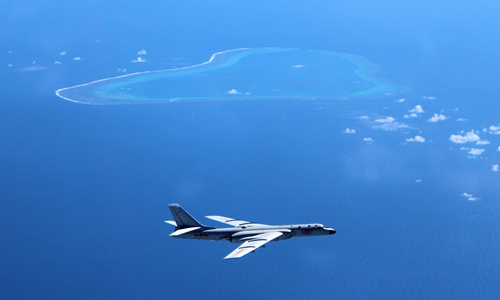Does Washington want a showdown in South China Sea?
Source: Global Times Published: 2020/7/14 18:23:40

A Chinese H-6K bomber patrolling islands and reefs including Huangyan Dao in the South China Sea. File photo: Xinhua
US Secretary of State Mike Pompeo's Monday announcement of the US' formal rejection of China's claims in the South China Sea means that Washington is no longer pretending to remain neutral on territorial disputes in the waters. It signals the US has decided to take a clear-cut position and it wants a showdown with Beijing on the issue.
From the 1970s, when frozen relations between China and the US began to thaw, until the end of the Cold War, the US did not involve itself with territorial disputes in the South China Sea. Yet decades later, especially after the US launched its rebalance to the Asia-Pacific strategy, Washington has sought to intervene under the pretext of safeguarding freedom of navigation and opposition against any use of force to change the status quo.
The two excuses are aimed at China, as the US believes only China has the strength to change the maritime status quo and only China has been hindering US-defined freedom of navigation in the South China Sea.
The US was merely hinting its opposition against China in the South China Sea issue in the past, while Pompeo's statement makes this openly stark. The US now stands on the opposite side of China and is aiming to turn the waters into a hot spot again.
Over the past few years, the situation in the South China Sea has improved significantly. China and its neighboring countries have made progress in negotiations over a code of conduct. Yet at this point, the US has stirred up troubles again, hoping to rope in relevant countries and jointly mount pressure on China.
Putting out such a statement is the first step, what is the US going to do next? It is highly likely to increase its already frequent military operations in the waters under the banner of carrying out freedom of navigation operations; send out more military aircraft and fighter jets to the region; strengthen military existence around the South China Sea, launch joint maritime patrol missions and even military drills with countries including Indonesia, Malaysia and Vietnam.
The US may also incite claimant countries to file lawsuits against China - just like how the Philippines raised the South China Sea arbitration matter. It is even possible for Washington to sell more advanced patrol vessels, fighter jets and naval surveillance equipment to boost the countries' strength, and encourage them to besiege China in multilateral occasions, such as ASEAN summits and the East Asia Summit.
These cards have already been played out by the US before. Yet the US has hardly changed anything in respect of China's relevant development. Infrastructure construction work in the South China Sea islands has been going on. New airports have been built and tested. China's actions to safeguard its sovereign and territorial integrity there have never stopped and can even be argued to be of success.
What's more important, despite of its military advantages, China has refrained itself from using force to take back any islands occupied by peripheral states.
Beijing will not be influenced in the future if Washington plays the same old tricks again. Whatever proactive measures the US carries out next, China will display its "reciprocal" strategy to safeguard its sovereignty.
If the US launches military exercises in the waters, be it without arms or live-fire drills, it can expect the very same scale in return. The similar type of military exercises can be carried out by China to match it. If the US warships come within 12 nautical miles of Chinese soil in the name of freedom of navigation, China will not only issue warnings and send the Chinese navy to intercept them, but can also consider deploying more anti-ship weapons. If US fighter jets keep buzzing over the region, more air-defense missiles could be deployed. If the US carries out joint maritime drills with regional countries, so will China.
China has numerous cards to play. The only matter is whether or not Beijing wants to play them as it never wishes to see tensions running high in the region or deteriorating ties with its neighboring countries.
The US' latest statement may send a wrong message to other claimant countries in the South China Sea that the US encourages them to provoke China over territorial disputes and make them believe the US has their back. The truth is, when tensions escalate in the waters with even possibilities of military conflicts and regional security crises, it is those peripheral countries that will pay the highest prices. The US, after driving a wedge between China and other regional countries, will then be delighted to take a back seat to watch the scene.
The article was compiled by Global Times reporter Li Aixin based on an interview with Xin Qiang, deputy director of the Center for American Studies at Fudan University in Shanghai. liaixin@globaltimes.com.cn
Posted in: VIEWPOINT